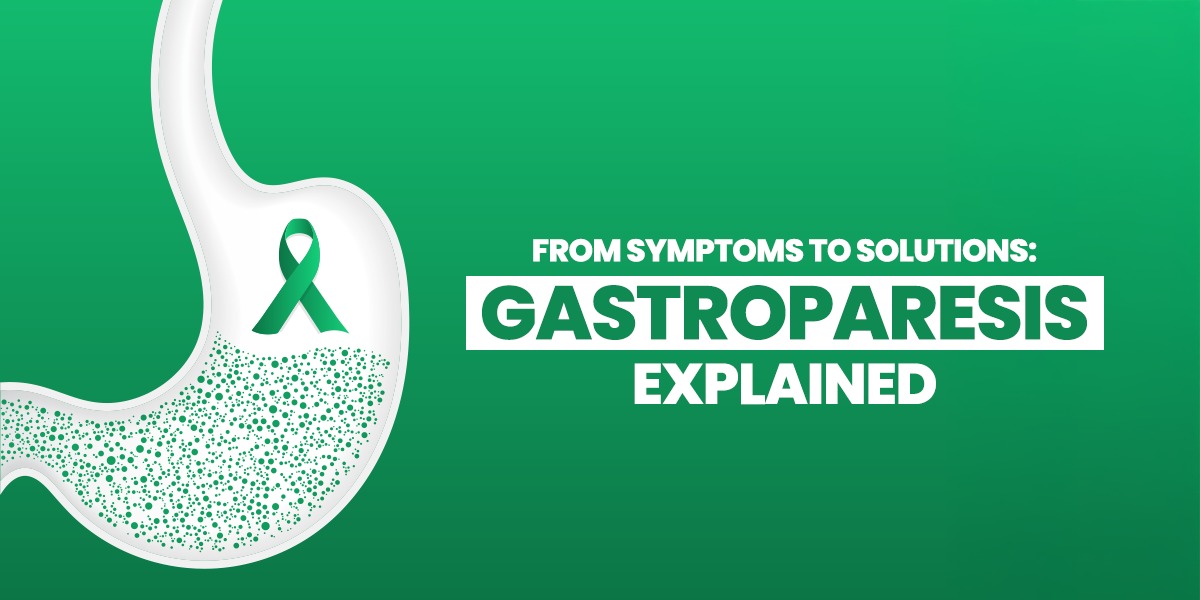Gastroparesis Medications: What Works and What to Expect

Gastroparesis is a chronic digestive condition that affects the stomach’s ability to empty properly. In this condition, the movement of food to the stomach is slowed down or stops, without any physical blockage. This causes the food to remain in the stomach much longer than normal. This condition can impact the quality of life, leading to digestive discomfort and nutritional deficiencies.
In this blog, we’ll explore the causes, common symptoms, treatment of gastroparesis, and what to expect during treatment.
What Causes Gastroparesis?
Various underlying conditions can trigger Gastroparesis. Here are some common causes:
- Diabetes: Diabetes is one of the leading causes of Gastroparesis. High sugar levels can, over time, damage the nerves that control the stomach.
- Neurological Disorders: Conditions such as Parkinson’s disease, multiple sclerosis, and stroke can interfere with the nervous system signals that control digestion.
- Post-surgical Complications: Abdominal or esophageal surgeries can also damage nerves or muscles involved in stomach emptying.
- Medications: Sometimes, even certain drugs can slow down stomach emptying.
- Autoimmune and Connective Tissue Disorder: Certain conditions, such as scleroderma or lupus, can affect muscle function in the GI tract.
Common Symptoms of Gastroparesis
Gastroparesis symptoms can range from mild to severe and may fluctuate over time. Some common symptoms include:
- Nausea
- Vomiting
- Feeling full quickly
- Bloating
- Abdominal pain or discomfort
- Loss of appetite
- Unintentional weightloss
- Acid reflux or heartburn
- Dehydration and malnutrition in severe cases
How Medications Help in Gastroparesis
Let us take a look at some of the most commonly prescribed Gastroparesis medications.
Prokinetic Agents
These drugs are used to help move the food through the digestive tract by increasing the muscular contractions in the stomach.
- Metoclopramide: This helps to enhance stomach contractions and blocks nausea signals in the brain. This is typically used for short-term, as long-term usage increases the risk of tardive dyskinesia.
- Domperidone: This is similar to metoclopramide. But it is most likely to affect the heart rhythm.
- Erythromycin: This is an antibiotic that stimulates motilin receptors, which stimulates motility. However, the problem is that it can lose effectiveness over time. And it might cause nausea, diarrhea, and potential antibiotic resistance.
Antiemetics
These medications are used to manage the most common symptom of Gastroparesis, which is nausea.
- Ondansetron: This medication blocks the receptors in the gut and brain to relieve nausea and vomiting. However, it may cause constipation or a headache.
- Promethazine: This drug is used as a Dopamine receptor blocker. This helps alleviate nausea and vomiting. It may cause dizziness and drowsiness.
Adjunct Medications and Supportive Therapy
These aren’t the first-line Gastroparesis treatment, but they might help in some cases.
- Tricyclic Antidepressants: These antidepressant pills help to relieve visceral pain and nausea.
- Gabapentin: This is useful for nerve-related abdominal pain. It may help patients with overlapping neuropathic symptoms.
- Laxatives or Stool softeners: The laxatives used for constipation can worsen gastroparesis symptoms.
Complementary and Emerging Therapies
While medication is the key, other options may offer additional support.
- Dietary management: Eat healthy and low-fat meals in smaller portions.
- Feeding tubes: The feeding tubes are for severe cases of malnutrition.
- Experimental drugs: Ongoing clinical trials are exploring newer prokinetics and treatments with fewer side effects.
What to Expect When Starting Medication
Starting treatment is a step-by-step process; hence, expectations should be realistic. Here are a few things that you must know:
Gradual Improvement
It may take many days or weeks for medications to start working. So one must be patient during this process.
Trial and Error
Not every medication works for everyone. You may have to try multiple drugs or combinations to find what works best for you.
Monitor Side-effects
Medications like metoclopramide and erythromycin have significant side effects. This happens especially with long-term use. Hence, follow up regularly with your doctor.
Medication Adjustments
Doctors might adjust dosages or switch medications based on side effects or lack of effectiveness. But never adjust doses on your own.
Integration with Other Treatments
Gastroparesis medications are often combined with dietary changes, hydration, and feeding tubes or gastric electrical stimulation in severe cases.
Conclusion
Gastroparesis is a complex condition, managing which is a balancing act. But with the right medical guidance and tailored treatment plan, many people manage their symptoms effectively. While medications can’t cure gastroparesis, they play a vital role in controlling nausea, promoting stomach emptying, and improving daily life.
For people living with Gastroparesis, it’s important to work closely with a gastroenterologist. With ongoing research and new treatments emerging, there’s hope for better management and improved quality of life.
If you or someone you know is facing this issue, visit the gastrointestinal surgery in Kanpur at Regency Healthcare.
Also Read: Gallbladder Surgery Guide: Symptoms, Procedure & Recovery Tips

 Call-an-Ambulance
Call-an-Ambulance



